Part One:
In Search of the Real Barack Obama: Can a Black Senate Candidate Resist the DLC?
By BAR Managing Editor Bruce Dixon
Originally published in Black Commentator on June 5, 2003
Barack Obama, a constitutional law professor and state senator from the south side of Chicago, is a leading candidate for the US Senate in the March 2004 Illinois Democratic primary. It's an open seat with no incumbent. In a crowded field that includes three well-known and better-funded opponents, Obama is definitely a contender. But who is Barack Obama?

A former community organizer not long out of Harvard Law School, Obama was tapped in 1992 to head up Project VOTE Illinois, where he was responsible for registering 120,000 new Democratic voters, mostly minorities, and chasing the greater part of them out to the polls that November. Barack and his team made a significant contribution toward Bill Clinton carrying Illinois that year and enabled Carol Moseley Braun to squeak by a Republican opponent to become the first and only black woman ever to sit in the US Senate. In 1996 Obama was elected to the Illinois state senate. At the midpoint of a four-year term in 2000, Obama challenged incumbent congressman Bobby Rush and was trounced in the Democratic primary by almost 2 to 1. He is the sponsor of a bill in the Illinois legislature requiring local police departments in Illinois to record the race of anyone stopped for questioning so that the data can be used to track the occurrence of racial profiling.
Energizing the base
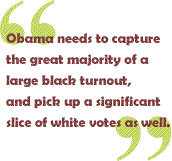 To win the Democratic primary election in Illinois, where African Americans cast at least a quarter of the ballots, Obama needs to capture the great majority of a large black turnout, and pick up a significant slice of white votes as well. To secure a general election victory in a presidential election year Obama will have to fire up an expanded Democratic base and turn the election into a crusade against the incumbent president and his party. Can he do it?
To win the Democratic primary election in Illinois, where African Americans cast at least a quarter of the ballots, Obama needs to capture the great majority of a large black turnout, and pick up a significant slice of white votes as well. To secure a general election victory in a presidential election year Obama will have to fire up an expanded Democratic base and turn the election into a crusade against the incumbent president and his party. Can he do it?
At an antiwar meeting last October Obama was certainly pitching to that Democratic base in the progressive and African American community:
"I don't oppose all wars ... What I am opposed to is a dumb war. What I am opposed to is a rash war. What I am opposed to is the cynical attempt by Richard Perle and Paul Wolfowitz and other arm-chair, weekend warriors in this Administration to shove their own ideological agendas down our throats, irrespective of the costs in lives lost and in hardships borne.
"What I am opposed to is the attempt by political hacks like Karl Roves to distract us from a rise in the uninsured, a rise in the poverty rate, a drop in the median income ... to distract us from corporate scandals and a stock market that has just gone thru the worst month since the Great Depression.
"That's what I'm opposed to. A dumb war. A rash war. A war based not on reason but on passion, not on principle but on politics .... "
Somebody else's brand of politics appears to have intruded on Obama's campaign. For a while the whole speech could be found on Obama's campaign web site, a key statement of principle for a serious US Senate candidate in an election season when the President's party threatens the world with permanent war and pre-emptive invasion, and cows US citizens with fear mongering, color coded alerts, secret detentions and the abrogation of constitutional liberties. Although Obama may have appeared at meetings of other citizens opposed to the war or let them use his name, no further public statements from the candidate on these important issues have appeared.
Then, a few weeks ago, Barack Obama's heartfelt statement of principled opposition to lawless militarism and the rule of fear was stricken without explanation from his campaign web site, and replaced with mild expressions of "anxiety":
But I think [people are] all astonished, I think, in many quarters, about, for example, the recent Bush budget and the prospect that, for example, veterans benefits might be cut. And so there's discussion about that, I think, among both supporters and those who are opposed to the war. What kind of world are we building?
And I think that's - the anxiety is about the international prospects and how we potentially reconstruct Iraq. And the costs there, then, tie in very directly with concerns about how we're handling our problems at home.
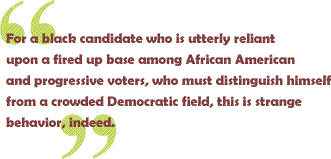 His passion evaporated, a leading black candidate for the US Senate mouths bland generalities on war, peace and the US role in the world. Barack Obama, professor of constitutional law, is mum on the Patriot Act, silent about increased surveillance of US citizens, secret searches, and detentions without trial. His campaign literature and speeches ignore Patriot Act 2, which would detain US citizens without trial, strip them of their nationality and deport them to - wherever, citizens of no nation.
His passion evaporated, a leading black candidate for the US Senate mouths bland generalities on war, peace and the US role in the world. Barack Obama, professor of constitutional law, is mum on the Patriot Act, silent about increased surveillance of US citizens, secret searches, and detentions without trial. His campaign literature and speeches ignore Patriot Act 2, which would detain US citizens without trial, strip them of their nationality and deport them to - wherever, citizens of no nation.
For a black candidate who is utterly reliant upon a fired up base among African American and progressive voters, who must distinguish himself from a crowded Democratic field, this is strange behavior, indeed. Polls show Blacks have consistently opposed administration war policies by at least two to one, as does the white progressive "base" of the party. Yet Obama appears determined to contain, rather than amplify, these voices.
No win without a fight
Rep. Jesse L. Jackson Jr. (D-Chicago), perhaps Obama's most prominent supporter among local elected officials, knows well the power of passion in the political process. Jackson has taken pains to state and restate his opposition to the Bush party's doctrine of "preventive war," both on constitutional and moral grounds, and wastes no opportunity to denounce it as utterly unjustified. Rep. Jackson also has some salient thoughts on the flavor that African American progressive candidates representing the views of their base bring to general elections nationally, or in big states like Illinois.
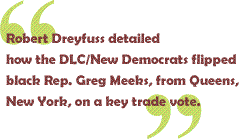 On p. 460 of his recent book "A More Perfect Union," Rep. Jackson spells out the possible benefits to the Democratic Party of nominating a black candidate for vice-president. The presence of a progressive black candidate, said Jackson, automatically turns the conversation to the left, and gets the base's juices flowing.
On p. 460 of his recent book "A More Perfect Union," Rep. Jackson spells out the possible benefits to the Democratic Party of nominating a black candidate for vice-president. The presence of a progressive black candidate, said Jackson, automatically turns the conversation to the left, and gets the base's juices flowing.
"An African American on the ticket enhances the chances of winning for a good candidate .... It also converts a conventional campaign into an enthusiastic crusade."
But you don't spark a crusade by running away from your base. So how should we understand Obama's sudden reticence to express and represent the views of his base in the black and progressive communities of Illinois?
It is the mission of the Democratic Leadership Council (DLC) to make it financially attractive to Democratic candidates and office holders to take stands diametrically opposed to the interests of their constituents, to sound and vote more like corporate friendly Republicans. In an excellent American Prospect article two years ago, Robert Dreyfuss detailed how the DLC/New Democrats flipped black Rep. Greg Meeks, from Queens, New York, on a key trade vote.
Dooley (a DLC operative) hooked Meeks up with a stream of corporate officials from Silicon Valley and the New York financial district. "My boss made sure there'd be support for Meeks from the business community," says a Dooley aide. "He spread the word, through groups like the Business Roundtable, that here was a guy who deserved their support."
Congressman Dooley helped bring in businesses who otherwise Congressman Meeks would not have known, and didn't have a relationship with, to knock on his door. As a result, scores of meetings were held with the congressman, says an aide to Meeks, citing sit-downs with the CEOs of American Airlines and New York Life Insurance Company. High-tech executives helped ensure that Meeks would be one of two undecided members to accompany President Clinton on his high-profile trip to China before the vote, the aide said; and Meeks also won significant backing from industry political action committees, which ended up nearly matching labor's donations to Meeks's campaign treasury. Included were $5,000 PAC contributions from American Airlines and New York Life. And in the end, Meeks voted business's way.
"We're trying to raise money to help them lessen their reliance on traditional interest groups in the Democratic Party," offers a DLC field director. "In that way," he adds, "they are ideologically freed .... "
Barack Obama is listed in the DLC/New Democrats directory of local elected officials, and was featured in its 100 Democratic Leaders to Watch in 2003. It would be a shame if he is in the process of becoming "ideologically freed" from the opinions of the African American and other Democrats whose votes he needs to win.

The DLC/New Democrat position is identical to that of the White House, "free" and scornful of all opposition voices. Here we have it the words of DLC founder Al From.
" ... Democrats must overcome both their own and the opposition's partisan instincts, and act in the national interest. The president's decision to prosecute this war without explicit authorization from the United Nations was a close call, but it was the right call.
" ... Iraq is clearly involved in both the quest for weapons of mass destruction and in fomenting anti-Western terrorism, whether or not there are direct links between Baghdad and Al Qaeda. The risks of war are eclipsed by the risk of tolerating a conjunction between terrorists and weapons of mass destruction, in a country ruled by a bitter enemy of America, and in the most volatile region of the world."
There are definitely multiple voices in Obama's ear right now. On the one hand, there are the DLC/New Democrats, the right wing corporate funded arm of the Democratic Party. Their consistent advice is to shut up and support the president's war at home and abroad, to get away from the concerns of "special interests" like minorities, working Americans, environmentalists and the uninsured, and peel off some not-too-conservative Republican swing votes. Their champion is Connecticut Senator Joseph Lieberman, the most rightwing of the Democratic candidates for President.
On the other hand, there is Barack Obama's Democratic base - African Americans, who don't support the war, and other Democratic voters who don't support President Bush. In fact, according to the Gallup and Zogby polls the most strongly held common issue among those opposed to the president is opposition to the war. Should Obama fail to vigorously attack the party of war and corporate plunder he will lose the opportunity to energize and expand his base. The crusade will be smothered in its crib - the DLC's proven formula for failure.
Who is wooing whom?
Obama's web site features a praiseful article from the March 6 - 12 issue of N'Digo Magazine - a piece that could have been written by Obama's own hand, last October: "Shunning the allure of huge corporate dollars and the recognition that would accompany them, Obama's philosophy is grounded in altruism," said the magazine. How, then, does one explain his association with the DLC, the corporate money apparatus of the Democratic Party?
This is not the Barack Obama that Illinois progressives would like to support. It is not the Barack Obama who can win a primary or general election in a season where the President  kicks off his campaign from the deck of an aircraft carrier impersonating Top Gun. It's not the Barack Obama who can win in the year that Republicans will wind up their convention at Ground Zero NYC, the second week of September 2004, screaming "Terror!" at the top of their lungs. Unless Barack Obama recovers his lost voice, he will have no answer.
kicks off his campaign from the deck of an aircraft carrier impersonating Top Gun. It's not the Barack Obama who can win in the year that Republicans will wind up their convention at Ground Zero NYC, the second week of September 2004, screaming "Terror!" at the top of their lungs. Unless Barack Obama recovers his lost voice, he will have no answer.
Instead, Obama seems to be listening to the voice of DLC founder and CEO Al From, who in February declared to so-called New Democrats, "Your most formidable opponent isn't Bush or your fellow contestants for the nomination. Your real enemy is the ghost of Democrats past." Those "ghosts" are the "activists" and "special interests" of the Democratic Party - the very same code words that Republicans use for Blacks, unions and advocates of Obama's own, cherished "altruism."
Will Barack Obama renew the challenge he made in his now vanished speech last October?
I am not opposed to all wars. I'm opposed to dumb wars.
So for those of us who seek a more just and secure world for our children, let us send a clear message to the president today.
You want a fight, President Bush? Let's finish the fight with Bin Laden and Al Qaida, thru effective, coordinated intelligence, and a shutting down of the financial networks that support terrorism, and a homeland security program that involves more than color-coded warnings.
You want a fight, President Bush? Let's fight to make sure that the UN inspectors can do their work, and that we vigorously enforce a non-proliferation treaty, and that former enemies and current allies like Russia safeguard and ultimately eliminate their stores of nuclear material, and that nations like Pakistan and India never use the terrible weapons in already in their possession, and that the arms merchants in our own country stop feeding the countless wars that rage across the globe.
You want a fight, President Bush? Let's fight to make sure our so-called allies in the Middle East, the Saudis and the Egyptians, stop oppressing their own people, and suppressing dissent, and tolerating corruption and inequality, and mismanaging their economies so that their youth grow up without education, without prospects, without hope, the ready recruits of terrorist cells.
You want a fight, President Bush? Let's fight to wean ourselves off Middle East oil, through an energy policy that doesn't simply serve the interests of Exxon and Mobil.
Those are the battles that we need to fight. Those are the battles that we willingly join. The battles against ignorance and intolerance. Corruption and greed. Poverty and despair.
The consequences of war are dire, the sacrifices immeasurable. We may have occasion in our lifetime to once again rise up in defense of our freedom, and pay the wages of war. But we ought not - we will not - travel down that hellish path blindly. Nor should we allow those who would march off and pay the ultimate sacrifice, who would prove the full measure of devotion with their blood, to make such an awful sacrifice in vain."
Barack Obama's web site proudly features this quote from the candidate: "Anybody who knows the U.S Senate, knows (that) to be the only African American in that body is a tremendous responsibility."
Obama's campaign to date leaves a question hanging, heavily. Responsible to whom?
Part Two:
"Not Corrupted by DLC, Says Obama?
by Bruce Dixon and Glen Ford
Originally published in Black Commentator on June 19, 2003

Illinois State Senator Barack Obama rejects any “suggestion” that “inclusion of my name” on a Democratic Leadership Council/New Democrats membership list amounts to “an endorsement on my part of the DLC platform.”
In a June 13 letter to The Black Commentator, the Black candidate for U.S. Senate defended his civil liberties, anti-war, and social welfare legislative record, and requested “that folks take the time to find out what my views are before they start questioning my passion for justice or the integrity of my campaign effort.”
Specifically, State Senator Obama maintains that an October 2002 anti-war speech was removed from his campaign web site because “the speech was dated once the formal phase of the war was over, and my staff's desire to continually provide fresh news clips.” The speech was returned to the site following  Associate Editor Bruce A. Dixon’s June 5 commentary, “In Search of the Real Barack Obama: Can a Black Senate candidate resist the DLC?” in which Mr. Dixon remarked, “Somebody else's brand of politics appears to have intruded on Obama's campaign.”
Associate Editor Bruce A. Dixon’s June 5 commentary, “In Search of the Real Barack Obama: Can a Black Senate candidate resist the DLC?” in which Mr. Dixon remarked, “Somebody else's brand of politics appears to have intruded on Obama's campaign.”
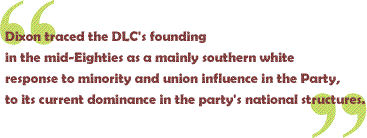
The “somebody” Dixon had in mind was, of course, the DLC/New Democrats.
Dixon, a Chicagoan currently living in Atlanta, also authored  ’s June 12 Cover Story, “Muzzling the African American Agenda – with Black Help: The DLC’s corporation dollars of destruction.” Dixon traced the DLC’s founding in the mid-Eighties as a mainly southern white response to minority and union influence in the Party, to its current dominance in the party’s national structures, based largely on the DLC’s role as broker of corporate contributions to candidates and incumbents. Dixon wrote:
’s June 12 Cover Story, “Muzzling the African American Agenda – with Black Help: The DLC’s corporation dollars of destruction.” Dixon traced the DLC’s founding in the mid-Eighties as a mainly southern white response to minority and union influence in the Party, to its current dominance in the party’s national structures, based largely on the DLC’s role as broker of corporate contributions to candidates and incumbents. Dixon wrote:
“The DLC's mission is to erase the last vestiges of social democracy from the Democratic Party, so that the corporate consensus will never again be challenged in the United States. Acting as a Republican Trojan Horse in the bowels of the Democratic machinery, the DLC claims the "real" party lives somewhere off to the right, where George Bush dwells, and that minorities, unionists, environmentalists, feminists, men and women of peace - virtually every branch of the party except corporatists - must be purged or muzzled.”
State Senator Obama says he “didn’t object to the DLC's inclusion of my name on their list.” That is precisely the problem, from which all suspicions reasonably flow. As we wrote in our September 19, 2002 “Trojan Horse Watch”:
“Every African American politician associated with the DLC should be considered suspect, and closely watched. There is no reason for them to be there except to make deals with the party's right wing - which believes that Gore lost the 2000 election largely because he became too closely identified with Blacks and labor.”
Rather than tiptoe around the edges of the issue, we are presenting State Sen. Obama with three “bright line” policy questions that will determine definitively if he has any good reason to belong to the DLC. But first, his letter in its entirety:
Dear Black Commentator:

I read with interest, and some amusement, Bruce Dixon's recent article regarding my campaign, and his suggestion that perhaps my positions on critical issues facing this country are somehow being corrupted by the influence of the Democratic Leadership Council (DLC). Given that Bruce [and I] worked together back in 1992 to empower communities through organizing and the ballot box, I wish he'd taken the time to give me a call and check out his facts.
To begin with, neither my staff nor I have had any direct contact with anybody at DLC since I began this campaign a year ago. I don't know who nominated me for the DLC list of 100 rising stars, nor did I expend any effort to be included on the list beyond filling out a three line questionnaire asking me to describe my current political office, my proudest accomplishment, and my cardinal rules of politics. Since my mother taught me not to reject a compliment when it's offered, I didn't object to the DLC's inclusion of my name on their list. I certainly did not view such inclusion as an endorsement on my part of the DLC platform.
As for Bruce's larger point -- that I've begun to water down my criticisms of the Bush administration during this early phase of my campaign -- I'd invite him to join me on the campaign trail here in Chicago for a couple of days. I'm proud of the fact that I stood up early and unequivocally in opposition to Bush's foreign policy (and was the only U.S. Senate candidate in Illinois to do so). That opposition hasn't changed, and I continue to make it a central part of each and every one of my political speeches. Likewise, I spend much of my time with audiences trying to educate them on the dangers of both the Patriot Act, Patriot Act 2, and the rest of John Ashcroft's assault on the Constitution. The only reason that my original anti-war speech was removed from my website was a judgment that the speech was dated once the formal phase of the war was over, and my staff's desire to continually provide fresh news clips. The "bland" statement that Bruce offers up as an example of my loss of passion wasn't an official statement or speech at all, but a 30 second response to a specific question by Aaron Brown on CNN about the mood of Illinois voters a few days after the war started.
In sum, Bruce's article makes nice copy, but it doesn't reflect the reality of my campaign. Nor does it reflect my track record as a legislator. In the last three months alone, I passed and sent to Illinois governor's desk 25 pieces of major progressive legislation, including groundbreaking laws mandating the videotaping of all interrogations and confessions in capital cases; racial profiling legislation; a new law designed to ease the burden on ex-offenders seeking employment; and a state earned income tax credit that will put millions of dollars directly into the pockets of Illinois' working poor.
As Bruce may tell you, I've always preached the need for elected officials and candidates to be held accountable for their views. I don't exempt myself from that rule. I'd simply ask that folks take the time to find out what my views are before they start questioning my passion for justice or the integrity of my campaign effort. I'm not hard to reach.
In the meantime, I'll talk to my staff about sprucing up the website!
Sincerely,
State Senator Barack Obama
Candidate for U.S. Senate
 replies
replies
From: The Publishers of The Black Commentator
To: The Honorable Barack Obama
Dear Sen. Obama:
We appreciate your willingness to respond to Bruce Dixon’s June 5 commentary. As the publishers of  , we have taken it upon ourselves to reply to your letter in order to make it clear that Dixon’s views are completely in line with our own, and to place the exchange in the context of the central question our publication has raised since its inception: What possible reason could a Black progressive have for joining the DLC?
, we have taken it upon ourselves to reply to your letter in order to make it clear that Dixon’s views are completely in line with our own, and to place the exchange in the context of the central question our publication has raised since its inception: What possible reason could a Black progressive have for joining the DLC?
There is no doubt that you joined of your own accord. Although you minimize the weight of your decision to be listed in the New Democrat Directory, and treat your being featured as one of the DLC’s “100 to Watch” as a simple compliment that even a mother would enjoy, we give you credit for knowing better than that. Al From and the DLC leadership are claiming you as one of their own, for their purposes. We assume that, as an intelligent man and an astute politician, you have your own reasons for linking your name with the DLC. We respect you, and take it as a given that you give a great deal of thought to such public associations.
Dixon did make several calls to your office, although he readily admits that he did not treat the matter as urgent. The fact at the heart of the story – that needs no verification – is that a Black activist/intellectual/politician with previously stellar progressive credentials has joined the main mechanism of corporate, rightwing influence in the Democratic Party. The publishers agree with Dixon that there was no need to justify the piece with a say it ain’t so telephone exercise.
Regarding the comings and goings of the October 30 anti-war speech on your campaign site: Collectively, the publishers of  have been in the news business about two-thirds of a century. We are fully aware that campaign sites and literature feature those items that the candidate and his handlers choose to highlight. Placement is reflective of the candidate’s campaign
have been in the news business about two-thirds of a century. We are fully aware that campaign sites and literature feature those items that the candidate and his handlers choose to highlight. Placement is reflective of the candidate’s campaign  posture, and the subject of intense staff discussion. That’s political journalism 101, not tealeaves. As Bruce Dixon remarked in his response to one of your supporters (“…you Obama basher!“) in
posture, and the subject of intense staff discussion. That’s political journalism 101, not tealeaves. As Bruce Dixon remarked in his response to one of your supporters (“…you Obama basher!“) in  ’s June 12 e-Mailbox column, we were “happy” to discover that the truly rousing speech had been restored to the site. “We think this is good news and hope that it still reflects candidate Obama's views,” said Dixon. He looked forward to seeing the text of speeches on the Patriot Act, “secret detentions, summary deportations and the like” featured on the site, especially in light of your renown as a professor of constitutional law.
’s June 12 e-Mailbox column, we were “happy” to discover that the truly rousing speech had been restored to the site. “We think this is good news and hope that it still reflects candidate Obama's views,” said Dixon. He looked forward to seeing the text of speeches on the Patriot Act, “secret detentions, summary deportations and the like” featured on the site, especially in light of your renown as a professor of constitutional law.
In your letter, you write that you often speak to audiences on “the dangers of both the Patriot Act, Patriot Act 2, and the rest of John Ashcroft's assault on the Constitution.” We do not doubt that this is true. However, as veteran political observers we also know that the candidate’s most carefully crafted public persona is reflected in his literature. If it’s not on the site, then experience tells us that the campaign is downplaying the issue.
You should be neither “surprised” nor “amused” that a progressive Black publication puts you, a former “top notch, progressive political organizer,” under scrutiny. You have joined the DLC! What else could you have possibly expected?
Rather than dither on the periphery of the matter, we are posing three “bright line” questions to you, that should determine whether you belong in the DLC, or not:
1. Do you favor the withdrawal of the United States from NAFTA? Will you in the Senate introduce or sponsor legislation toward that end?
2. Do you favor the adoption of a single payer system of universal health care to extend the availability of quality health care to all persons in this country? Will you in the Senate introduce or sponsor legislation toward that end?
3. Would you have voted against the October 10 congressional resolution allowing the president to use unilateral force against Iraq?
We believe you are likely to answer, “Yes” to all three of these questions. If that is true, you favor positions that are anathema to the leadership of the Democratic Leadership Council, and have misplaced yourself.
We call these “bright line” questions because DLC leadership has been unequivocal in their support of NAFTA, opposition to anything resembling national health insurance, and fervently in support of the Iraq war – basic issues of war and peace, life and death, and livelihood.
NAFTA:
The DLC was the principal voice inside the Democratic Party advocating the North American Free Trade Agreement, which led to the loss of hundreds of thousands of manufacturing jobs. A majority of Democrats opposed DLCer 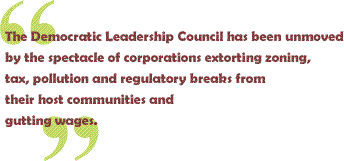 Bill Clinton’s treaty in 1993. The DLC minority joined with Republicans, insisting that “NAFTA will create jobs…” (New Democrats Online, September 13, 1993) and would not “…substantially alter the existing rules of investment for U.S. companies seeking to lower their costs with cheap labor” (NDOL, October 1, 1993).
Bill Clinton’s treaty in 1993. The DLC minority joined with Republicans, insisting that “NAFTA will create jobs…” (New Democrats Online, September 13, 1993) and would not “…substantially alter the existing rules of investment for U.S. companies seeking to lower their costs with cheap labor” (NDOL, October 1, 1993).
Unrepentant, the Democratic Leadership Council has been unmoved by the spectacle of corporations extorting zoning, tax, pollution and regulatory breaks from their host communities and gutting wages, benefits and pensions of US workers under the threat of relocation. As recently as last year the DLC continued to champion “fast track” authority for a Republican president, and objected strenuously to even the tiniest weakening (see American Prospect, July 2002) of NAFTA’s infamous Chapter 11, which lets corporations invalidate union contracts or the zoning, banking, wage and hour, safety or environmental regulations of any state or country it deems “inconsistent with free trade” in secret international courts where the public is not represented.
Universal health insurance/care:

The Democratic Leadership Council unequivocally opposes anything that smells like a national health insurance plan, let alone single payer. Here’s what DLC founder and chief honcho Al From thinks of Rep. Dick Gephardt’s proposal to let private insurers extend health care coverage to everyone, financed by federal tax credits:
"Every primary season unleashes the pander virus. Dick Gephardt's $2.5-trillion health care plan is the latest case in point. While Gephardt is right to base his candidacy on 'big ideas,' his health plan only underscores the folly of appealing to Democratic activists instead of the Democratic rank-and-file. When activists think big, they always do so with the rank-and-file's money."
 notes with approval your sponsorship of the Bernardin Amendment in the Illinois Senate. Authored by Dr. Quentin Young of Physicians for a National Health Care Plan, and Illinois Lieutenant Governor Pat Quinn, the legislation would enshrine a constitutional right to quality health care for everyone in that state. Needless to say the amendment has yet to pass.
notes with approval your sponsorship of the Bernardin Amendment in the Illinois Senate. Authored by Dr. Quentin Young of Physicians for a National Health Care Plan, and Illinois Lieutenant Governor Pat Quinn, the legislation would enshrine a constitutional right to quality health care for everyone in that state. Needless to say the amendment has yet to pass.
We imagine that you’d want to advance the same goal in the U.S. Senate. Should you do so – or support any form of national health insurance – you will then become an object of scorn to the DLC, as a vector of “the pander virus.”
Iraq resolution:
In the April 15 issue of the DLC house organ Blueprints, DLC founder Al From starts off likening the arguments of antiwar Democrats to what he calls the 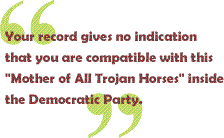 “blatantly anti-American sentiments of student radicals and the hard left” of the Vietnam era, and warns Democrats that they will suffer “guilt-by-failure-to-disassociate” with such types. He next endorses the president’s illegal war and occupation of Iraq and summons Democrats to do the same:
“blatantly anti-American sentiments of student radicals and the hard left” of the Vietnam era, and warns Democrats that they will suffer “guilt-by-failure-to-disassociate” with such types. He next endorses the president’s illegal war and occupation of Iraq and summons Democrats to do the same:
“Democrats must overcome both their own and the opposition's partisan instincts…. The president's decision to prosecute this war without explicit authorization from the United Nations was a close call, but it was the right call.”
This is the company you have chosen to keep. The DLC will gather hundreds of “New Democrats” for display at its “National Conversation” in Philadelphia, July 19. You are among the DLC’s “100 to Watch” in 2003. They are doubtless expecting you.
Your record gives no indication that you are compatible with this “Mother of All Trojan Horses” inside the Democratic Party, as Bruce Dixon puts it. Early in your letter, you say that you did not “expend any effort to be included on the [DLC] list beyond filling out a three line questionnaire asking me to describe my current political office, my proudest accomplishment, and my cardinal rules of politics.” This is quite a different DLC affiliation process than the one described by Robert Dreyfuss in his American Prospect article:
To ensure that liberals don't slip through the cracks, NDN requires each politician who seeks entree to its largesse and contacts to fill out a questionnaire that asks his or her views on trade, economics, education, welfare reform, and other issues. The questions are detailed, forcing candidates to state clearly whether or not they support views associated with the New Democrat Coalition, and it concludes by asking, "Will you join the NDC when you come to Congress?" Next, [the DLC] interviews each candidate, and then NDN determines which candidacies are viable before providing
 Trusting your word and knowing Dreyfuss to be a very good reporter, we must conclude that Al From and his crew value your presence in the DLC very highly, and therefore spared you the full corporate shakeout. Apparently, they were quite eager to recruit a Black progressive willing to step across some very “bright lines” to adorn the literature of an organization that opposes his own core political positions.
Trusting your word and knowing Dreyfuss to be a very good reporter, we must conclude that Al From and his crew value your presence in the DLC very highly, and therefore spared you the full corporate shakeout. Apparently, they were quite eager to recruit a Black progressive willing to step across some very “bright lines” to adorn the literature of an organization that opposes his own core political positions.
Should you answer our questions on NAFTA, universal health care and the Iraq war in the affirmative, there is no honorable option available to you but to publicly withdraw from the DLC.
We respectfully await your reply
- The Publishers of The Black Commentator
Part 3 of 3
Obama To Have Named Removed From DLC List
Says "New Democrats" Acted 'Without My Knowledge"
by Glen Ford
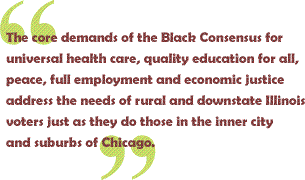
Barack Obama will not be carrying the Democratic Leadership Council’s baggage in his race to become the second Black person to represent Illinois in the U.S. Senate. The state senator and professor of constitutional law has told The Black Commentator that he is acting to have his name stricken from the “New Democrats Directory,” a list of several hundred DLC-affiliated elected officials.
“I am not currently, nor have I ever been, a member of the DLC,” said Obama, in a statement that substantially reflects a telephone conversation with  Associate Editor Bruce Dixon, this weekend. “It does appear that, without my knowledge, the DLC…listed me in their ‘New Democrat’ directory,” Obama continued. “Because I agree that such a directory implies membership, I will be calling the DLC to have my name removed, and appreciate your having brought this fact to my attention.”
Associate Editor Bruce Dixon, this weekend. “It does appear that, without my knowledge, the DLC…listed me in their ‘New Democrat’ directory,” Obama continued. “Because I agree that such a directory implies membership, I will be calling the DLC to have my name removed, and appreciate your having brought this fact to my attention.”
The statement caps a three-week public dialogue (see links at bottom of page) between  and Obama, a veteran progressive organizer who headed the voter registration and mobilization drive that carried Carol Moseley-Braun to the U.S. Senate in 1992 – the first and only such achievement by a Black woman. Obama faces a crowded and richly financed field of contestants for the Democratic senatorial nomination, next year. African Americans make up about a quarter of the Illinois Democratic electorate.
and Obama, a veteran progressive organizer who headed the voter registration and mobilization drive that carried Carol Moseley-Braun to the U.S. Senate in 1992 – the first and only such achievement by a Black woman. Obama faces a crowded and richly financed field of contestants for the Democratic senatorial nomination, next year. African Americans make up about a quarter of the Illinois Democratic electorate.
 was shocked to find Obama’s name associated with the New Democratic Movement, an affiliate of what Bruce Dixon calls the “Republican Trojan Horse in the bowels of the Democratic machinery” – the DLC. In a June 19 Cover Story that included a letter from Obama,
was shocked to find Obama’s name associated with the New Democratic Movement, an affiliate of what Bruce Dixon calls the “Republican Trojan Horse in the bowels of the Democratic machinery” – the DLC. In a June 19 Cover Story that included a letter from Obama,  posed three “bright line” questions to the candidate, “that should determine whether you belong in the DLC, or not.”
posed three “bright line” questions to the candidate, “that should determine whether you belong in the DLC, or not.”
1. Do you favor the withdrawal of the United States from NAFTA? Will you in the Senate introduce or sponsor legislation toward that end?
2. Do you favor the adoption of a single payer system of universal health care to extend the availability of quality health care to all persons in this country? Will you in the Senate introduce or sponsor legislation toward that end?
3. Would you have voted against the October 10 congressional resolution allowing the president to use unilateral force against Iraq?
 asserted that a “Yes” answer to all three questions would be “anathema” to the DLC, whose leadership “has been unequivocal in their support of NAFTA, opposition to anything resembling national health insurance, and fervently in support of the Iraq war – basic issues of war and peace, life and death, and livelihood.”
asserted that a “Yes” answer to all three questions would be “anathema” to the DLC, whose leadership “has been unequivocal in their support of NAFTA, opposition to anything resembling national health insurance, and fervently in support of the Iraq war – basic issues of war and peace, life and death, and livelihood.”
Aware of Obama’s consistently progressive legislative record,  suggested that the only “honorable option” was that he “publicly withdraw from the DLC.”
suggested that the only “honorable option” was that he “publicly withdraw from the DLC.”
Here is State Senator Barack Obama’s response:
Dear Black Commentator:
Let me begin by saying that I’ve enjoyed the dialogue that we seem to be developing on these e-pages, and hope it continues as my campaign progresses.

I also appreciate your desire to focus on specific issues that should be of interest to all progressives, both inside and outside of the Democratic Party. My views on universal health care, the unilateral use of force in Iraq, and NAFTA are in fact what you might expect given my previous history and voting record.
I favor universal health care for all Americans, and intend to introduce or sponsor legislation toward that end in the U.S. Senate, just as I have at the state level. My campaign is also developing a series of interim proposals – such as an expansion of the successful SCHIP program – so that we can immediately provide more coverage to uninsured children and their families.
I would have voted against the October 10th congressional resolution authorizing the President to use unilateral force against Iraq. I believe that we could have effectively neutralized Iraq with a rigorous, multilateral inspection regime backed by coalition forces. Nothing since the end of the formal fighting has led me to reconsider this stance; indeed, the inability of Saddam Hussein to mount even token resistance to American forces, the failure to discover any significant, deployable arsenals of biological or chemical weapons inside Iraq, and the on-going turmoil currently taking place in post-war Iraq, have only strengthened my views on the subject.
And although I believe that free trade - when also fair - can benefit workers in both rich and poor nations, I think that the current NAFTA regime lacks the worker and environmental protections that are necessary for the long-term prosperity of both America and its trading partners. I would therefore favor, at minimum, a significant renegotiation of NAFTA and the terms of the President’s fast track authority.
You are undoubtedly correct that these positions make me an unlikely candidate for membership in the DLC. That is why I am not currently, nor have I ever been, a member of the DLC. As I stated in my previous letter, I agreed to be listed as “100 to watch” by the DLC. That’s been the extent of my contact with them. It does appear that, without my knowledge, the DLC also listed me in their “New Democrat” directory. Because I agree that such a directory implies membership, I will be calling the DLC to have my name removed, and appreciate your having brought this fact to my attention.

I do think a broader question remains on the table. What is the best strategy for building majority support for a progressive agenda, and for reversing the rightward drift of this country?
One important part of that strategy - and on this I think we agree - is for progressives within the Democratic Party to describe our core values (e.g. racial justice, civil liberties, opportunity for the many, and not just the few) in clear, unambiguous terms.
A second part of that strategy - and again, I think we agree here - is to stake out clear positions on issues that put those values into action (e.g. the need for universal health care), and to stand up for those values when they are under assault (e.g. opposition to the Patriot Act).
But the third part of this part of the equation – and on this we may disagree – must be to gain converts to our positions. My job, as a candidate for the U.S. Senate, isn’t to scold people for their lack of ideological purity. It’s to persuade as many people as I can, across the ideological spectrum, that my vision of the future is compatible with their values, and can make their lives a little bit better. Thus, while I may favor common-sense gun control laws, that doesn’t keep me from reaching out to NRA members who are worried about their lack of health insurance. I favor affirmative action, but I’m still going after the votes of white union members who oppose affirmative action, because I think I can convince them that it’s Bush’s economic agenda, and not affirmative action, that is eroding their job security and stagnating their wages. And while I may object to the misogyny and materialism of much of rap culture, I’m still going to spend the time reaching out to a hip-hop generation in search of a future.
In other words, I believe that politics in any democracy is a game of addition, not subtraction. And I believe deeply enough in the decency of the American people to think that progressives can build a winning majority in this country, so long as we’re not afraid to speak the truth, and so long as we don’t write off big chunks of the electorate just because they don’t agree with us on every issue.
All of which explains why I’m not likely to launch blanket denunciations of the DLC or any other faction within the Democratic Party. I intend to engage DLC  members, just like I intend to engage everybody else that I can during the next year of campaigning, in a conversation about the direction our country needs to take to give ordinary working families a fair shake. In some instances, I may even agree with DLC positions: their insistence on the value of national service, or the need to harden domestic targets like chemical plants from potential terrorist attack, to cite a few examples I just pulled from the DLC web-site, make sense to me. Where I disagree with them – and, as we have already discussed, I disagree with them strongly on a lot of major issues - I intend to let them know, firmly and without equivocation, just why I think they are wrong.
members, just like I intend to engage everybody else that I can during the next year of campaigning, in a conversation about the direction our country needs to take to give ordinary working families a fair shake. In some instances, I may even agree with DLC positions: their insistence on the value of national service, or the need to harden domestic targets like chemical plants from potential terrorist attack, to cite a few examples I just pulled from the DLC web-site, make sense to me. Where I disagree with them – and, as we have already discussed, I disagree with them strongly on a lot of major issues - I intend to let them know, firmly and without equivocation, just why I think they are wrong.
To some, this approach may appear naïve; to others, it may appear that I’m headed down a path of dangerous compromise. All I can tell you is that in my twenty years as an organizer, civil rights lawyer, and state senator, I’ve always trusted my moral compass, and have thus far avoided compromising my core values for the sake of ambition or expedience. Hopefully, by listening to the people I seek to serve, and with the occasional jab from friendly critics like The Black Commentator, I can stay on that course, and ultimately do some good as the next U.S. Senator from the state of Illinois.
Sincerely,
State Senator Barack Obama
Candidate for the U.S. Senate
Speaking the same language
 is relieved, pleased, and looking forward to Obama’s success in the Democratic senatorial primary and Illinois general election.
is relieved, pleased, and looking forward to Obama’s success in the Democratic senatorial primary and Illinois general election.
There is plenty of room to argue over such things as whether NAFTA is a “free trade” agreement or an “investor rights agreement” – that’s the stuff of the progressive conversation.  is not seeking to martyr Barack Obama on a left-leaning cross. Associate Editor Bruce Dixon, who worked with Obama on the 1992 Illinois Project Vote campaign, puts it this way:
is not seeking to martyr Barack Obama on a left-leaning cross. Associate Editor Bruce Dixon, who worked with Obama on the 1992 Illinois Project Vote campaign, puts it this way:
As to the senator's larger goal of building a multiracial coalition around a progressive agenda, we think the broad outlines of an answer are quite visible. The core demands of the Black Consensus for universal health care, quality education for all, peace, full employment and economic justice address the needs of rural and downstate Illinois voters just as they do those in the inner city and suburbs of Chicago. Candidates who work to consistently advance this agenda in every community and region of this nation can count on a large and unified black vote as the foundation of a progressive majority. The opportunity is before us.
The DLC holds its “National Conversation” in Philadelphia, July 19. It is a corporate conversation, a racially coded attempt to re-institutionalize within the Democratic Party the ever-roiling White Backlash against Black political expression. Lots of African American enablers will be on hand, drawn by the scent of money. As we wrote in our September 19, 2002 Trojan Horse Watch, “Every African American politician associated with the DLC should be considered suspect, and closely watched. There is no reason for them to be there except to make deals with the party's right wing.”
Progressives will either purge the DLC from the commanding heights of the Democratic Party, or leave it to die like the terminally compromised Whig Party during the years immediately prior to the Civil War.
It’s time to draw some very “bright lines.”
“In search of the real Barack Obama: Can a Black Senate candidate resist the DLC?” by  Associate Editor Bruce A. Dixon, June 5
Associate Editor Bruce A. Dixon, June 5
“Muzzling the African American Agenda – with Black Help: The DLC’s corporate dollars of destruction,” by  Associate Editor Bruce A. Dixon, June 12
Associate Editor Bruce A. Dixon, June 12
“Not ‘Corrupted’ by DLC, Says Obama: Black U.S. Senate candidate responds to  critique,” June 19
critique,” June 19